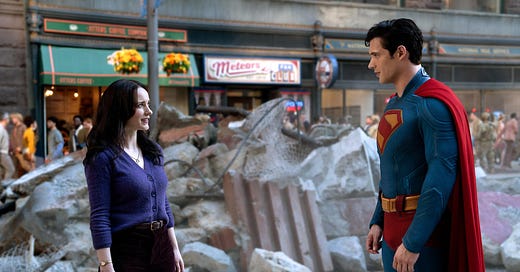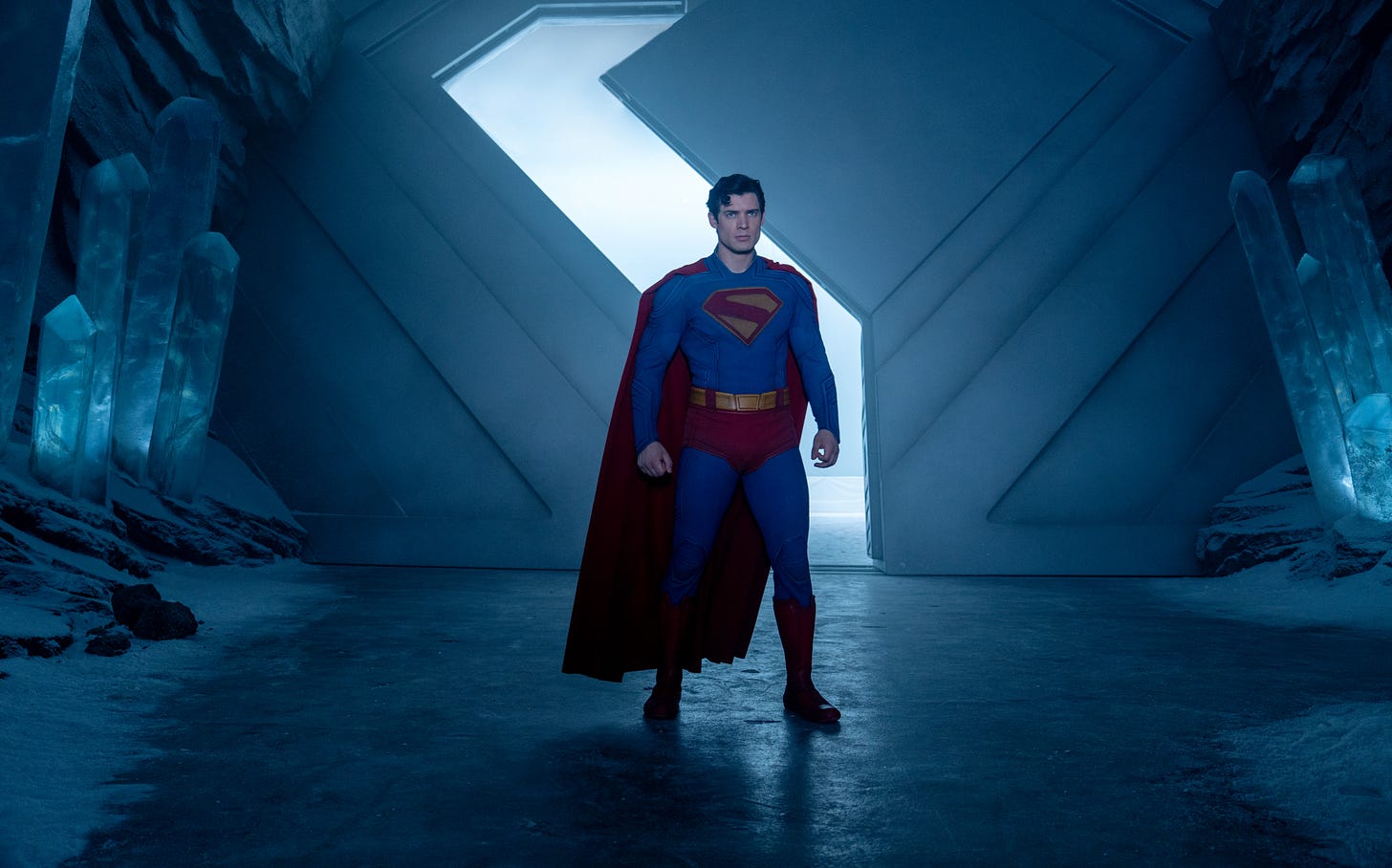This isn’t a unique take, but I really liked the new Superman movie.
I’m Canadian, and sometimes I think people outside this country don’t realize just how obsessed we are with that little nation to the south. Lately, I’ve found myself increasingly frustrated that one of our national news podcasts, CBC’s Front Burner, has been flooded with episodes about the United States. Here’s a sample of last week’s lineup:
“Medicaid cuts and RFK’s MAHA mission”
“Netanyahu in Washington, and a Gaza ceasefire?”
“Did the Texas floods have to be this deadly?”
“Will a ‘Free Tibet’ die with the Dalai Lama?”
“Case closed on the ‘Epstein’ list?”
To be fair, not all of these are strictly American stories but none are explicitly Canadian either. The RFK episode, for instance, did touch on how vaccine hesitancy in the U.S. could affect us here: if you let measles spread down there, what happens to our healthcare system up here? Still, I hope you see my point. We’re obsessed with America.
In 2015, Canada elected Justin Trudeau as its Prime Minister, seemingly ushering in a wave of optimism and progressive values (at least that’s what it felt like at the time). A year later, America elected Donald Trump.
I’m not really here to get into politics, but I do want to talk about the kind of media that emerged during that time. To me, that era is defined by shows like Schitt’s Creek and Ted Lasso—stories that wrapped us in a big, warm hug. They felt like a reaction to the chaos and cruelty that had seeped into everyday life. In a world that was suddenly loud, combative, and uncertain, these shows countered with kindness, community, and growth. They told us it was okay to be vulnerable. That decency wasn’t dead. That people, even flawed, selfish and broken people, could still become better.
But there was also a reaction to that wave. A moment when the pendulum swung the other way and we began hyper-examining the awful people at the center of our institutions. Only this time, they weren’t cool anti-heroes like Don Draper or Walter White. They were real. And they were terrifying. We got The Dropout, Inventing Anna, WeCrashed and Dopesick. We entered the age of the scammer docudrama, a genre obsessed with unmasking the seductive power of charisma, money, and tech-fueled delusion.
But you can only stay mad for so long.
But the emotional temperature of our culture was shifting. Which brings us to James Gunn’s Superman.
This feels like a new evolution of hyper-kindness. Not the soft-focus, small-town kindness of Ted Lasso or Schitt’s Creek, but something bolder. It says: yes, we can be decent. Yes, we can be gentle. And also, yes, we can punch a fascist in the face. It’s a version of hope that acknowledges the stakes.
Now I’m a bit of a comic novice but Superman, to me, has always had a fondness for humanity but an important piece of the story was that he isn’t himself one. While the Donner version of Superman embodied the perfect notion of a human, Gunn’s reflects the imperfect nature of us. It’s more empathy than ideal.
Both versions of Superman know that they should do the right thing. The 2025 Superman (played rather effectively by David Corenswet) doesn’t hesitate when he stops an attack by Jarhanpur on Boravio (a pretty clear metaphor for Israel/Gaza), he gets a lot of flack for the way he does it. He saved lives but did he do it the right way? His girlfriend, Lois Lane (played by Rachel Brosnahan) pushes on him for not following the rule of law. This feels very true of modern day action. Even the most acts of seemingly good will come with is dissected, doubted and dragged out online.
The image of whether Superman is doing the right thing all comes to a head when a video of his parents is translated, revealing that Jor-El and Lara send him to Earth so he can rule over them. Despite all the good he’s done, public perception shifts. He is arrested and sent to prison (in the superhero world, this means being in a cage in another realm, guarded by a man who can turn into any element).
The entire section feels deeply personal, if not autobiographical. In 2018, James Gunn himself was fired from Disney over resurfaced tweets. Like Superman, Gunn was forced to reckon with whether a single narrative could define him, no matter the good that he had done beforehand. Gunn was brought back and Superman, naturally does too. It’d be a pretty terrible ending if Superman was locked away and Lex Luthor ruled the world in his stead.
Superman escapes and retreats to the quiet of his childhood home in Kansas. It’s here that the film delivers the line that moved me most. Shaken and uncertain about his place in the world, he turns to his father, Jonathan, and asks the question at the heart of the movie: Who am I supposed to be? Jonathan doesn’t give him an answer. Instead, he offers something far more profound: “Parents aren’t there to tell their kids who they’re supposed to be.” He says they are there to help them when they make mistakes figuring it out. Chills. In a movie full of spectacle and moral complexity, this is the moment that will linger with me the longest. It’s a reminder that even Superman needs to be loved unconditionally.
So Superman returns to Earth and we get all sorts of fighting and shenanigans. The world literally becomes divided (a pretty on-the-nose metaphor but I like it) via the black hole portal opening up and spilling into Metropolis. Superman gathers his friends and fights back, finally confronting Lex Luthor (Nicholas Hoult).
Hoult then delivers his rationale for hating the caped hero. Lex Luthor doesn’t despise Superman because he’s dangerous. He despises him because he makes Luthor feel small. Luthor wants to be remembered as one of the greatest minds in history, a towering figure of intellect and legacy. But how can anyone compete with a god? When Superman exists, Lex's genius feels diminished, irrelevant. And so, it’s not ideology that drives him, it’s jealousy.
That kind of envy, the kind that recoils at someone else’s light, is the rot at the heart of so much evil. It’s a profoundly human flaw: the inability to celebrate goodness in others without feeling lesser ourselves. It’s an instinct that I have to fight within myself all the time. Gunn’s Superman makes the case that what saves us isn’t power or intellect, but empathy. The willingness to see strength in others and not be threatened by it is what binds people together. Luthor chooses resentment. Superman chooses connection. And that, ultimately, is what makes him the most human of us all.
What strikes me is how all of this circles back to that cultural tension I opened with. As a Canadian, we’re drawn to American stories and culture because it shapes so much of the world. James Gunn’s Superman is one of the rare stories that doesn’t just reflect the contradictions of the world we live in right now (one ruled over by Donald Trump and a path towards fascism), it offers a potential path through it.
And we need media like this right now. Stories that don’t flinch from complexity, but also don’t wallow in despair. Stories that remind us that sincerity isn’t weakness, that empathy isn’t naivety, and that choosing to believe in people, even when they disappoint you, is still a radical act. It’s not just that this version of Superman works. It’s that it matters.






